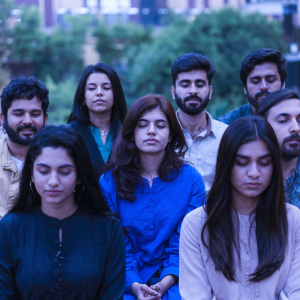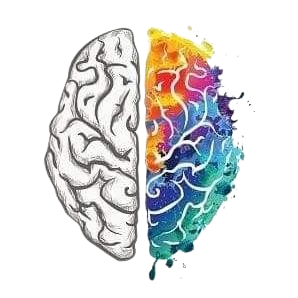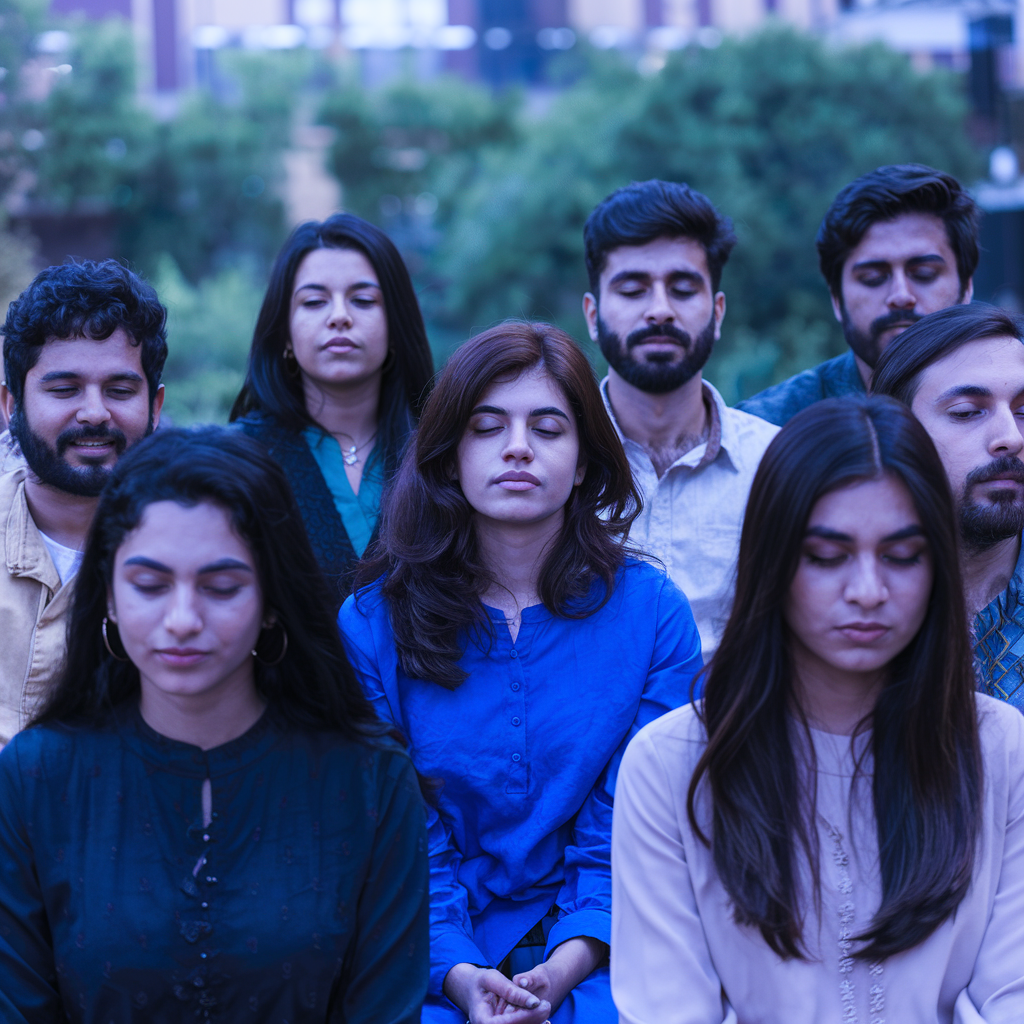The Silent Struggle: Why Mental Health is a Taboo in Pakistan

Imagine a house with tightly shut windows, even on the sunniest days. Inside, shadows dance, and whispers echo, but no one dares to open the doors and let the light in. This is often the reality of mental health in many Pakistani households – a silent struggle confined within the walls of stigma and shame. While the vibrant tapestry of Pakistani culture thrives on community and connection, a heavy cloak of silence drapes over conversations about mental well-being.
The statistics paint a stark picture: millions of Pakistanis grapple with conditions like depression and anxiety, yet only a fraction seek help. Why? Because in a society where appearances reign supreme, acknowledging mental health struggles can feel like admitting defeat. It’s a battle fought in the shadows, where fear of judgment and social isolation often outweigh the desperate need for support.
This silence, however, is a dangerous enemy. It allows misconceptions to fester, turning treatable conditions into debilitating burdens. It perpetuates the myth that mental illness is a weakness, a flaw in one’s character, rather than a health issue that deserves care and compassion. It’s time to break open those windows, to let the sunlight illuminate the mental health taboo in Pakistan, and begin the journey towards healing and acceptance.
Why Mental Health Stigma Pakistan: Exploring the Deep-Rooted Beliefs
In Pakistan, the struggle with mental health often begins long before the first symptom appears. It starts with the invisible weight of cultural norms, the unspoken expectations that shape our perceptions of what’s acceptable and what’s not. These deeply ingrained beliefs, passed down through generations, form the bedrock of the mental health stigma that pervades our society.
Traditional Beliefs and Misconceptions
Many traditional beliefs in Pakistan tend to attribute mental illness to supernatural forces, possession, or even punishment for sins. These misconceptions, while rooted in a different time, continue to cast a long shadow on how we view mental health. Conditions like depression and anxiety are often dismissed as “just a phase” or a sign of weakness rather than recognized as legitimate medical concerns requiring professional help.
The Pressure Cooker of Societal Expectations
Imagine growing up in a society where success is measured by academic achievements, career milestones, and the “perfect” family image. This relentless pressure to conform can take a toll on mental well-being. The need to maintain a façade of flawlessness leaves little room for vulnerability or acknowledging struggles. In such an environment, admitting to mental health challenges can feel like shattering the illusion of perfection, leading to fear of judgment and social repercussions.
Collectivist Culture and the Shadow of Family Honor
Pakistani culture, deeply rooted in collectivism, places immense value on family honor and reputation. This emphasis on the collective often overshadows individual needs and experiences. (Jungian perspective: This ties into the concept of the Collective Unconscious, where shared beliefs and values shape individual behavior and attitudes.) Mental illness, unfortunately, can be perceived as a stain on the family’s honor, leading to a tendency to conceal it rather than seek support. This prioritization of family image over individual well-being can create a suffocating environment where mental health struggles are silenced and suppressed.
The Fear of Ostracization and Judgment
Disclosing mental health challenges in Pakistan often comes with the fear of being labeled as “crazy” or “unstable.” This fear of social ostracization and judgment can be a powerful deterrent to seeking help. Individuals may worry about losing their jobs, damaging their marriage prospects, or being excluded from social circles. The fear of becoming an outcast can keep people trapped in a cycle of silence and suffering, preventing them from accessing the support they desperately need.
It’s crucial to recognize that these cultural norms and beliefs are not insurmountable barriers. By challenging misconceptions, fostering open conversations, and prioritizing individual well-being alongside family honor, we can begin to dismantle the stigma surrounding mental health in Pakistan. It’s time to create a society where seeking help is seen as a sign of strength, not weakness, and where everyone feels safe and supported in their journey towards mental wellness.
Mental Illness Pakistani Family: A Hidden Burden
Within the close-knit fabric of Pakistani families, mental illness often becomes a tightly guarded secret, a burden carried in silence and shrouded in shame. The fear of judgment, the pressure to uphold a flawless image, and the misconceptions surrounding mental health create a fertile ground for denial and avoidance. This reluctance to acknowledge and address mental health struggles can have far-reaching consequences for both individuals and families, perpetuating a cycle of suffering that spans generations.
Mental Illness as a Personal or Family Flaw
In many Pakistani families, mental illness is not viewed as a medical condition but rather as a personal failing or a blemish on the family’s reputation. (Jungian perspective: This aligns with the concept of the Shadow Self, the hidden aspects of our personality that we tend to repress or deny.) There’s a tendency to attribute mental health challenges to a lack of willpower, faith, or even character. This perception can lead to feelings of shame and guilt, making it difficult for individuals to open up about their struggles and seek the help they need.
The Shame and Guilt of Seeking Help
The stigma surrounding mental health in Pakistan creates a powerful sense of shame associated with seeking professional help. Many individuals and families worry that seeking therapy or medication will be perceived as a sign of weakness or instability. They fear that it will lead to gossip, social isolation, and damage to their reputation. This internalized shame can prevent people from reaching out for support, even when they are desperately struggling.
The Impact of Denial and Avoidance
Denial and avoidance are common coping mechanisms when it comes to mental health challenges in Pakistani families. Ignoring the problem, hoping it will simply go away, or attributing symptoms to other causes can have devastating consequences. Untreated mental illness can worsen over time, leading to increased suffering, strained relationships, and even tragic outcomes like suicide. The refusal to acknowledge and address mental health issues can create a ripple effect, impacting not only the individual but also their family and loved ones.
Generational Transmission of Stigma and Silence
The stigma surrounding mental health is often passed down through generations, perpetuating a cycle of silence and shame. Children who grow up witnessing their parents or elders hide their struggles may learn to internalize these same patterns of denial and avoidance. This generational transmission of stigma can create a lasting impact, making it even more challenging to break the cycle and foster open conversations about mental health.
It’s imperative to challenge these deeply ingrained beliefs and create a space where mental health is discussed openly and without judgment. By acknowledging the mental illness Pakistani family dynamic and addressing the shame and guilt associated with seeking help, we can begin to dismantle the stigma and pave the way for healing and acceptance. It’s time to break the cycle of silence and create a future where mental well-being is prioritized and supported within Pakistani families.
Religion and Misinterpretations
In a deeply religious society like Pakistan, faith plays a central role in shaping our understanding of the world, including our perceptions of health and well-being. However, when it comes to mental health, a complex interplay of religious beliefs and cultural interpretations can sometimes create barriers to seeking help and perpetuate the stigma surrounding mental illness. It’s crucial to address these misconceptions and bridge the gap between faith and well-being, recognizing that seeking professional mental health support can coexist with spiritual guidance and practices.
Addressing Misconceptions Surrounding Mental Illness and Religious Beliefs
One common misconception is that mental illness is a sign of weak faith or a punishment from God. This belief can lead to feelings of shame and guilt, preventing individuals from seeking help and potentially delaying their recovery. It’s important to remember that mental illness is a medical condition, just like any other physical ailment. It does not discriminate based on faith or piety. Seeking help for mental health challenges is not a sign of spiritual weakness but rather a courageous step toward healing and self-improvement.
Seeking Professional Help Alongside Spiritual Guidance
While faith and prayer can provide comfort and strength, they are not substitutes for professional mental health care. Just as we would consult a doctor for a physical illness, we should seek the expertise of mental health professionals for psychological and emotional distress. Therapists, counselors, and psychiatrists are trained to diagnose and treat mental health conditions, providing evidence-based interventions that can help individuals manage their symptoms and improve their overall well-being.
Islamic Teachings on Compassion and Empathy
Islam places a strong emphasis on compassion, empathy, and caring for those who are suffering. The Quran and the teachings of the Prophet Muhammad (peace be upon him) repeatedly emphasize the importance of kindness, support, and understanding towards those facing difficulties, including mental health challenges. These teachings encourage us to break the stigma surrounding mental illness and create a supportive environment where individuals feel safe seeking help without fear of judgment or shame.
Faith and Mental Health Support: A Harmonious Coexistence
Faith and mental health support can coexist harmoniously. Seeking professional help does not diminish one’s faith; instead, it demonstrates a commitment to taking care of one’s holistic well-being. Many mental health professionals in Pakistan are culturally sensitive and understand the importance of incorporating religious beliefs and practices into the therapeutic process. This integrated approach can be particularly effective in addressing the unique needs of individuals seeking Pakistan mental health help.
By challenging misconceptions, promoting open dialogue, and emphasizing the compatibility of faith and mental health care, we can create a more supportive and understanding environment for those struggling with mental health challenges in Pakistan. It’s time to bridge the gap between faith and well-being, ensuring everyone has access to the resources and support needed to thrive.
Overcome Mental Health Stigma Pakistan: A Call for Change
The time has come to break the silence that surrounds mental health in Pakistan. It’s time to dismantle the stigma, brick by brick, and build a society where individuals feel safe seeking help and support. This requires a collective effort, a shift in mindset that prioritizes compassion, understanding, and acceptance.
Open Conversations: The First Step Towards Healing
Encourage open and honest conversations about mental health within families and communities. Share personal stories, challenge misconceptions, and create a space where vulnerability is met with empathy, not judgment. By normalizing discussions about mental well-being, we can chip away at the stigma and foster a culture of support.
Self-Acceptance and the Journey of Individuation
Embrace self-acceptance as a crucial step towards healing. (Jungian perspective: This resonates with the concept of Individuation, the process of becoming a whole, integrated person.) Encourage individuals to acknowledge their struggles, embrace their strengths, and embark on a journey of self-discovery. This involves challenging societal expectations, honoring one’s unique identity, and prioritizing mental well-being.
Seeking Professional Help: A Sign of Strength, Not Weakness
Highlight the importance of seeking professional help. Encourage individuals to contact therapists, counselors, and psychiatrists who can provide evidence-based support and guidance. Emphasize that seeking help is not a sign of weakness but a courageous step towards healing and self-improvement.
Awareness and Education: Paving the Way for Change
Advocate for increased awareness and education about mental health in Pakistan. Support initiatives that promote mental health literacy challenge stigma, and provide accessible resources for individuals and families. By empowering individuals with knowledge and understanding, we can create a more informed and supportive society.
Conclusion
The journey towards mental wellness in Pakistan is undoubtedly a challenging one, paved with deeply ingrained cultural norms, misconceptions, and the weight of societal expectations. Yet, as we’ve explored in this blog, it is a journey that is possible, a struggle that can be overcome. By acknowledging the mental health taboo in Pakistan, we take the first step towards dismantling it.
Remember, seeking Pakistan mental health help is not a sign of weakness but a testament to your courage and resilience. Embrace self-acceptance, prioritize your well-being, and seek support from mental health professionals, family, and friends. Challenge the stigma within your own circles, fostering open conversations that chip away at the walls of silence.
The fight against mental illness in Pakistani family dynamics is a collective one. It requires a shift in mindset and a commitment to compassion and understanding. Together, we can create a society where mental health is prioritized, where seeking help is normalized, and where every individual feels safe and supported in their journey towards healing and acceptance. The path may be long, but the destination – a future where mental wellness thrives in Pakistan – is worth striving for.
FAQ: Mental Health in Pakistani Households
- Why is mental health considered a taboo topic in Pakistani households?
Mental health is often a taboo subject in Pakistani households due to a complex interplay of cultural norms, societal expectations, and traditional beliefs. Many people fear judgment and social isolation if they disclose their struggles with mental health. This silence can be incredibly damaging, preventing individuals from seeking necessary help and perpetuating harmful stereotypes.
- How do traditional beliefs and cultural norms affect perceptions of mental health in Pakistan?
Traditional beliefs often attribute mental illness to supernatural forces, possession, or religious punishment, leading to stigma and discouraging individuals from seeking professional help. Additionally, societal pressures to maintain a perfect image and prioritize family honor over individual needs force many to suppress their mental health challenges.
- What role does family play in addressing mental health within the Pakistani community?
Family plays a significant role, but the dynamics can be complex. While families are meant to be a source of support, the pressure to uphold a flawless family image can lead to denial and avoidance of mental health issues. This often results in individuals suffering in silence, fearing they will shame or burden their families.
- Why is there a fear of seeking professional help for mental health issues in Pakistan?
The stigma surrounding mental health fosters a deep-seated fear of being labeled as “crazy” or “weak” for seeking professional help. Individuals worry about social ostracism, damage to their reputation, and negative consequences in their personal and professional lives.
- Are religious beliefs a barrier to seeking mental health support in Pakistan?
While faith is a source of comfort for many, misconceptions surrounding religion and mental health can sometimes create obstacles. Some believe mental illness signifies weak faith or divine punishment, preventing individuals from seeking professional help. It’s crucial to emphasize that mental illness is a medical condition that can affect anyone, regardless of their faith.
- How can we challenge the mental health stigma within Pakistani communities?
Challenging the stigma requires a multifaceted approach: promoting open conversations about mental health, normalizing seeking professional help, and increasing awareness through education initiatives. It’s crucial to create a safe space for individuals to share their experiences without fear of judgment and encourage them to see seeking help as a sign of strength, not weakness.
- How can we encourage self-acceptance and help individuals prioritize their mental well-being?
Encouraging self-acceptance starts with challenging societal expectations and embracing individuality. We must promote the idea that seeking help is a courageous act of self-care, not a sign of weakness. Individuals need to understand that prioritizing their mental well-being is essential and doesn’t diminish their worth or detract from their other responsibilities.
- What does the future hold for mental health awareness and support in Pakistan?
By fostering open dialogue, challenging stereotypes, and advocating for accessible mental health resources, a future where mental well-being is prioritized in Pakistan is within reach. Continuing to address the stigma and empower individuals to seek help will pave the way for a healthier and more supportive society.


